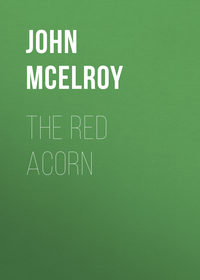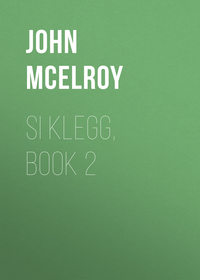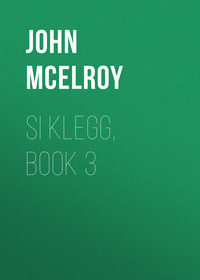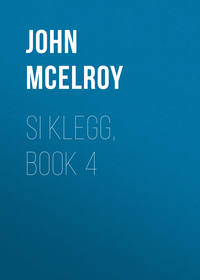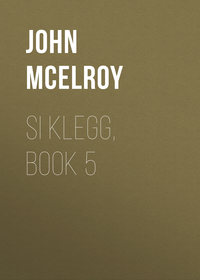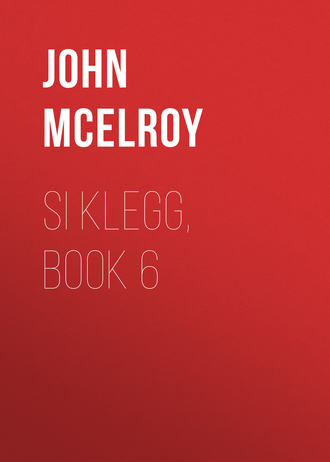 полная версия
полная версияSi Klegg, Book 6
"Go to blazes," retorted the rebel, swinging his gun more wildly than ever. "Yo'uns is all liars. No dependence kin be placed on y'. If y' want me, come and git me."'
Shorty had begun to think the thing somewhat humorous. "Look here, Johnny," said he, "wouldn't you like a big chaw o' navy terbacker—bright plug. Genuine Yankee plug? Swingin' that ere gun that way is awful tiresome."
"Eh—What's that?" said the rebel, startled by the new proposition and its coolness.
"I say, don't you want a big chaw o' terbacker? You must need it. I always do after I've bin workin' hard. Drop your gun, and have one with me. We're Injiannians, and we don't mean no harm to your partner, nor to you. We'll take care o' him, if he's hurt. Here, cut your own chaw."
"Air yo'uns from Injianny?" said the rebel, bringing his gun down to a less menacing attitude. "I've done got two brothers in Injianny, and I hear they'uns 've done inlisted in Yankee rijiments. Mebbe yo'uns know 'em."
"Mebbe we do," said Shorty, handing him a long plug and his knife. "But we hain't time to talk it over now. We'll do that in the mornin', when business ain't so pressin'. Le' me hold your gun while you cut your terbacker."
"Now, look here," said Si, "time's jumpin', and we must talk quick. If we parole you, will you stay here, and take care o' your partner and the others, and be here in the mornin', when we send for you?"
"You won't send for me, if yo'uns is a-gwine on ter fout we'uns up at the mill. We'uns chaw yo'uns up, or run y' outen the country."
"We'll take care o' that," said Si sharply. "Will you promise on your honor to stay with these men, and take care o' them till daylight, if we don't come sooner?"
"Sartin,—'pon honor," answered the rebel, with his mouth full of tobacco.
"All right, then. Load at will. Load! Forward!—March!" commanded Si.
Si moved on cautiously, for he feared that the runaways had told those attacking the mill about his advance, and would bring them all down upon him. The dying down of the firing about the mill confirmed this opinion. He warned his boys to make as little noise as possible, and went ahead of them some distance, to reconnoiter, slipping along the side of the road, under the shadow of the trees. He arranged a system of signals with Shorty, by which one click of his gunlock meant halt, and two to come ahead. Presently he came in sight of the broad race which ran to the mill. The starlight was sufficient to show its width and its banks, with the logs lying along, which had been cut when it was dug. A bridge crossed the race for the road to the mill. Beyond the ground rose sharply, and looking at the crest against the sky, he could see the rebels, one by one, file over, and come down to where they could crouch behind the logs and ambuscade the bridge.
Si clicked his gunlock, and waited till he had counted 25 rebels gathered there, which seemed to be all, as no more appeared. Then he slipped back to Shorty, and hurriedly explained the situation.
The boys listened with sinking hearts. More than three times as many rebels as they themselves numbered, and perhaps fiercer and stronger than those they had already encountered.
The elation of their recent victory subsided. Again the woods became ominously dark and gloomy, the soaking dampness very depressing. They huddled together to brace each other up.
"Si," said Shorty, "didn't you say that it was a squad o' the Maumee Muskrats in the mill, and that we wuz goin' to relieve 'em."
"Yes, and the Orderly said that railroad 'Mick'—Hennessey—was the Sarjint in command."
"O, that bog-trottin' old section boss, that hairy-handed artist with the long shovel, is there, is he with his crucifix and his prayers to the Saints. That's all right. He's bin stormin' and swearin' ever since the fight begun; because he's bin obliged to stay inside and shoot, and instid of making a grand rush and settling things, according to Donnybrook Fair rules. I tell you what you do. You work the boys carefully down through the brush toward the race, and git 'em into position in easy range of the rebels, covering 'em behind logs. I'll take a circuit around to the left, and git over to the hill, behind the rebels, and near enough the mill for Hennessey to hear me. Then I'll fire a shot and yell for Hennessey. He knows my voice, and he'll bring his men out like a pack o' hornets. Then you let into the rebels from your side. They can't git across the race at you, and we'll have 'em where we kin whipsaw 'em."
"Shorty," said Si admiringly, "Gen. Grant 'll hear o' you some day, and then Co. Q will lose its brightest star, but the army'll gain a great General."
"I know it; I know it," said Shorty, modestly; "but don't stop to talk about it now. I think I've got the lay o' the mill in mind. I'll just cut around that way. Don't shoot till you hear me."
Si quietly deployed his boys to the left of the road, and worked them through the brush until they came to the crest overlooking the mill-race. They took readily to this sort of work. They had all hunted rabbits over the hills of southern Indiana, and they came into position so softly that the rebels beyond did not suspect their presence.
Then came a long wait for the signal from Shorty. The rebels seemed to get tired first. Presently they could be seen moving around, and Si had hard work restraining his squad from shooting at the tempting marks. Then the rebels began talking, at first in murmurs, and then louder. There seemed to be a division of opinion among them. Those who had been run back were sure that the Yankee were coming on to the relief of their comrades in the mill. The others thought that their comrades had run the other away just as fast.
"I tell you, hit's no use to wait for they'uns no longer," said one strong voice. "Them Yankees is runnin' back to their camps as fast as they'uns's legs 'll carry they'uns. If yo'uns 'd had any sand, and stood yer ground, you'd 'a seed 'em. But yo' yaller hammers allers git the ager when ever a cap's busted, and run yer rabbit-gizzards out."
"Y're a liar," hotly responded another voice. "Thar was more'n 50 o' them Yankees, if thar was a man. We fit 'em awful, before we give away, and they'd killed Burt Dolson and Bob Whittyker, and I don't know how many more. They come bulgin' right on toward the mill, arter they'd reformed. I know hit, bekase Eph and me staid and watched 'em, and shot at 'em, till we thought hit best to run back and warn ye."
"Ye wuz in a powerful hurry to warn us," sneered the other. "Well, thar's no Yankees over thar, and none haint a-comin' till daylight. I've ketched all the ager and rhematiz here that I'm a-gwine ter. Le's go back and salivate them fellers in the mill, and set fire to it."
This seemed to be the prevailing sentiment, and Si began to fear that they would all go, and might intercept Shorty. He was on the point of ordering the boys to fire, and attract their attention, when Shorty's rifle rang out, and the next instant came a roar from Shorty's powerful lungs, with each word clear and distinct:
"Hennessy—you—red—mouthed—Mick—come out. The 200th Injianny is—here. Come out—with a rush—you—imported spalpeen—and jump—'em—in—the—rear!"
"Now, boys," commanded Si, "keep cool, pick your man, and fire low. I'm goin' to take the feller that's bin doin' the big talkin'."
Each of the boys had already picked his man, and was eagerly waiting the word. Their fire threw their enemies into confusion, and as their guns rattled, the barricaded doors of the mill were thrown open, and Hennessey rushed out with a wild Irish "hurroo." The rebels incontinently fled, without an attempt at resistance.
After it was ascertained that every unhurt rebel was running for dear life to get away, after Hennessey and his squad had gathered up the wounded and carried them into the mill, and after the boys had yelled themselves hoarse over their victory gained with such unexpected ease, they suddenly remembered that they were so tired that they could scarcely drag one foot after another, and hungrier than young wolves at the end of a hard Winter.
"Gewhillikins," murmured Jim Humphreys, "I wonder when we're going to have supper. I'm as holler as a stovepipe."
"You've got your suppers in your haversacks," said Si. "We'll go into the mill and build a fire and make some coffee and fry some meat."
"In my haversack," said Jim ruefully, after they had entered the mill, and he had run his hand into his forgotten haversack, and withdrawn it covered with a viscid greasy mush. "My haversack's full o' water, that's soaked everything else in it to a gruel."
"So's mine; so's mine," echoed the rest, as they examined.
"Confound it," said Si' wrathfully, as he looked into one after another. "Didn't none o' you have sense enough to fasten down the covers carefully, so's to keep the water out? Here it is—salt and sugar and coffee, bread and greasy pork all in one nasty mess. I declare, you don't seem to have the sense you wuz born with. You've bin breakin' yourselves down luggin' around 10 or 15 pounds o' water, besides spilin' your rations."
"Probably Sarjint Hennessey has some rations that he kin give us," suggested Shorty, who was genuinely sorry for the poor boys.
"Dade I haint—not a smidgeon," answered Hennessey. "We ixpicted ye's to git here this forenoon and relieve us, and we et up ivery spoonful of our grub for breakfast, so's to lighten us for a quick march back to camp. They've not bin runnin' in the mill for several days, and've carted off ivery bit of the male they ground. We're nigh starved oursilves, but we've had a lovely little foight, and we forgive ye's for not coming airlier. Oi wouldn't 've missed that last rush on thim divil's for a month's double rations."
"Well," said Si, encouragingly, "we'll have to make mine and Shorty's rations go around as well as they kin, among all of you. Fish the meat out o' your haversacks, boys, and wash the dope off it. It ain't spiled, anyway. We kin each of us have a little to eat tonight, and we'll trust to Providence for termorrer."
CHAPTER XI. SHORTY GIVES THE BOYS THEIR FIRST LESSON IN FORAGING
WITH the elasticity of youth the boys slept away their fatigue during the night, but woke up the next morning ravenously hungry.
"What in the world are we goin' to do for grub, Si?" asked Shorty, as soon as he got his eyes fairly open.
"Oi know what Oi'm goin' to do," said Hennessey. "Oi'm goin to show the foinest pace av shprinting back to camp that has been sane in these parts since our roight bruk that day at Chickamaugy. No grass'll grow under me fate, Oi tell yez. And as I pass through your camp Oi'll foind yer Captain, and tell the fix you're in, and to sind out some rations."
"But even if he does send them at once, they can't git here till evenin', and I hate powerfully to let him and the rest know that we didn't have sense enough to take care o' our victuals after we'd drawed 'em," said Si.
"If it was only one, or even two days, I'd let the boys starve it out, as a good lesson to 'em," said Shorty. "But three seems like cruelty to dumb beasts."
"But what'll they say about us in camp?" groaned Si. "They'll have the grand laugh on me and you, and every one o' the boys. I'd ruther go on quarter rations for a month than stand the riggin' they'll give us, and have Capt. McGillicuddy give me one look when he asks the question about how we come to lose all our rations so soon? He'll think me a purty Sarjint to send out into the country in charge o' men, and you a fine Corpril."
"Say," said Shorty, his face illuminated with a bright idea. "We might report the rations 'lost in action.' That'd fix it fine. We had two good fights, and come out ahead. That'll tickle the Captain so that he won't be partickler what we report."
"Hurroo!" echoed Hennessey; "that's the ticket."
"But we didn't lose 'em in action, and to say so'd be a lie," answered Si, whose conscience had none of the easy elasticity of his partner's. "We could report 'em burnt up by lightnin','but we won't. They was lost by sheer, dumbed carelessness, that me and you and the boys should knowed better than to've allowed. That's all there is of it, and that's what I'm goin' to report, if I have to."
"Great Jehosephat," exploded Shorty; "you kin certainly be the stubbornest mule over nothin', Si Klegg, that I ever seen. We've done fightin' enough to excuse sich a report, or any that we've a mind to make."
"Nothin' kin justify a lie," persisted the obdurate Si.
"Holy smoke! bigger men than you—lots bigger—have squared up their accounts that way. Didn't all the Captains in the rijiment, and the Quartermaster and Commissary, and, for what I know, the Chaplain and the Colonel, git clean bills o' health after the battle o' Stone River, by reportin' everything that they couldn't find 'lost in action?'"
"Yis," added Hennessey, "and didn't my Captain, after Chickamaugy, git us all new uniforms and complete kits, by reportin' iverything 'lost in action?' Smart man, my Captain, Oi tell yez."
"Well, I don't think any the more o' them for it. We spiled our rations before the fightin' begun, they'd bin spiled if there'd bin no fightin', and I haint going to send no other words, if I've got to send any word."
"Who the divil's goin' to carry this word, Oi'd like to know, Misther Klegg?" broke in Hennessey. "Are you goin' to put words into my mouth, Misther Klegg? Oi'll tell your Captain just fwhat Oi plaze, about you and your foight and your rations. Oi want no more worrids wid ye. Attintion, min! Shoulder, a-r-m-s! Roight face! Forward, foile left!—M-a-r-c-h!"
"I s'pose I ain't responsible for any o' the fairy tales with which that wild Mick'll fill up the Captain," said Si, self-consolingly, as Hennessey and his squad marched away in quick time. "He'll put a rich, red, County Connaught color on everything that's happened out here, and the Captain'll believe as much as suits him. Anyhow, Hennessey'll not say anything to our disadvantage, and probably the Captain'll send out some rations by fast mule express."
"Yes," accorded Shorty; "we'll git some rations from camp by this evenin'. Cap will look out for that. Meanwhile, I'll take out two or three o' the boys on a scout into the country, to see if we can't pick up something to eat."
"Humph," said Si, skeptically, "you'll find mighty poor pickin', after them Ohio boys 's bin out here three days. What they haint taken has been rooted in the ground."
"Yes; they're awful foragers and thieves," assented Shorty. "All Ohio boys is. I'm glad I'm from Injianny. Still, I've generally bin able to find something, even after the Ohio boys had bin there."
"Well, I think we'd better first go back and see about them rebels that we wounded last night. They may be sufferin' awfully, and we oughtn't to think about something to eat, before doin' what we kin for them."
"That's so," assented Shorty. "I'd a-gone back last night, but we was all so dead tired."
"Well, I'll take two o' the boys and go back. You stay here with the rest, and hold the mill. I'll git back as soon's I kin, and then you kin take a couple o' the boys and go out foragin'."
Calling Alf Russell and Monty Scruggs to follow him, Si started back to the scene of the skirmish of the night before. The woods looked totally different, under the bright Spring sunshine, from what they had seemed in the chill, wet blackness of the previous night. Buds were bursting and birds singing, and all nature seemed very blithe and inspiring.
"Gracious, what a difference daylight makes in the woods," murmured Monty Scruggs. "Tain't a bit like Hohenlinden.
"'Tis morn, but scarce yon lurid sunCan pierce the war-clouds rolling dun,Where furious Frank and fiery HunShout 'mid their sulphurous canopy.""You'd think, from the way the bird 's singing, and the flowers blooming, that there'd never been a gun fired within a hundred miles o' here."
"Seems like we only dreamed all that happened last night," accorded Alf Russell. "There's nothing in the woods or the ground that looks as it did then, and I can't hardly make myself believe that this is the way we come."
"Well, here's something that'll convince you it wasn't a dream," said Si, as they made their way through the broken and trampled brush, and came to a little knoll, on which the final fight had been made, and where were gathered the wounded rebels. There were three of these; the man whom Shorty had shot in the shoulder, the one whom Si knocked down by a stunning blow on the head, and the one who had been hit in the thigh by a shot from the boys, and who was the "pardner" of the recalcitrant man of the previous evening. He was still there, caring for his comrades. The men who had been shot were so faint from loss of blood that they could scarcely move, and the man whom Si had struck was only slowly recovering consciousness.
The unhurt rebel was standing there with his gun in hand, and had apparently been watching their approach for some time.
"My parole was out at daylight," he said, as they came up. "The sun's now nearly an hour high. I ain't obleeged to be good no more, and I could' 've drapped one o' yo'uns when y' fust turned offen the road, and got away. I s'pose I'd orter've done hit, and I'd a great mind ter, but suthin' sorter held me back. Onderstand that?"
"You'd a' bin a nice man to've shot at us when we wuz comin' to help your comrades," said Si, walking up coolly toward him, and getting near enough to prevent his leveling his gun, while he held his own ready for a quick blow with the barrel. "We needn't've come back here at all, except that we felt it right to take care o' the men that got hurt."
"Come back to take keer o' the men that yo'uns swatted last night?" said the rebel incredulously. "That haint natural. 'Taint Yankee-like. What'd yo'uns keer for 'em, 'cept to see if they'uns's dead yit, and mebbe gin 'em a prod with the bayonit to help 'em along? But they'uns's mouty nigh dead, now. They'uns can't last much longer. But I'll kill the fust one o' yo'uns that tries to prod one o' they'uns with a bayonit. Let they'uns alone. They'll soon be gone."
"What're you talkin' about, you dumbed fool?" said Si, irritably. "We haint no Injuns nor heathens, to kill wounded men. We're Injiannians and Christians, what read the Bible, and foller what it says about lovin' your enemies, and carin' for them what despitefully use you—that is, after you've downed 'em good and hard."
"Does your Bible say that ere?" asked the rebel.
"Yes, indeed."
"Well, hit must be a new-fangled kind of a Yankee Bible. The only Bible I ever seed was a piece o' one that used t' be in dad's house, and I've done heared strangers read hit aloud hundreds o' times, and hit said nothin' like that. Hit had lots in it 'bout killin' every man and man-child, and hewin' 'em to pieces afore the Lord, but nothin' 'bout lovin' and takin' keer o' them that wuz fernest ye."
"Well, it's in there, all the same," said Si impatiently, "and you must mind it, same's we do. Come, drop that gun, and help us take care o' these men. They ain't goin' to die. We won't let 'em. They're all right. Just faint from loss o' blood. We kin fix 'em up. Set your gun agin' that beech there, and go to the branch and git some water to wash their wounds, and we'll bring 'em around all right."
There was something so masterful in Si's way, that the rebel obeyed. Si set his own gun down against a hickory, in easy reach, and had the boys do the same. He had naturally gained a good deal of knowledge of rough surgery in the army, and he proceeded to put it to use. He washed the wounds, stayed the flow of blood, and to take the rising fever out of the hurts, he bound on them fresh, green dockleaves, wet with water. After the man he had struck had had his face washed, and his head thoroughly doused with cold water, he recovered rapidly and was soon able to sit up, and then rise weakly to his feet.
The rebel looked on wonderingly.
"Well, yo'uns is as good doctrin' hurts as ole Sary Whittleton, and she's a natural bone-setter," he said.
"Well, don't stand around and gawk,", said Si snappishly. "Help. What's your name?"
"Gabe Brimster."
"Well, Gabe, go down to the branch and git some more water, quick as you kin move them stumps o' your'n. Give the men all they want to drink, and then pour some on their wounds. Then go there and cut some o' them pawpaws, and peel their bark, to make a litter to carry your pardner back to the mill. Boys, look around for guns. Smash all you kin find on that rock there, so they won't be of no more use. Bust the locks good, and bend the barrels. Save two to make the handles of the litter."
Si proceeded to deftly construct a litter out of the two guns, with some sticks that he cut with a knife, and bound with pawpaw strips.
A few days before, Si, while passing near the hospital, saw a weak convalescent faint and fall. He rushed to the Surgeon's tent, and that officer being busy, handed him a small bottle with a metal top, and filled with strong ammonia, telling him to unscrew the top and hold the bottle under the man's nose. He did so, with the effect of reviving him. Si thrust the bottle into his pocket, to help the man back to the hospital, and forgot all about it, until one after another of his present patients overdid himself, had a relapse, and fainted away. Si happened to feel his bottle, drew it out, unscrewed the top, thrust it under their noses, and revived them.
Gabs's eyes opened wider at each performance. He had never seen a bottle with a metal top, or one that unscrewed, or anything that seemed to effect such wonderful changes by merely pointing it at a man. His mountaineer intellect, prone to "spells" and "charms," saw in it at once an instrument of morta: witchcraft. With a paling face, he began edging toward his gun. Busy as Si had been, he had kept constantly in mind the possibility of Gabe's attempting some mischief, and did not let himself lose sight of the rebel's gun. He quickly rose, and with a few strides, placed himself between Gabe and his gun.
"Where are you goin'?" he said sternly.
"I'm a-gwine away," replied the man, in terror-stricken accents. "I'm a-gwine away mouty quick. I don't want to stay here no longer."
"Indeed you're not goin' away. You'll stay right with us, and help us take care o' your comrades."
"I'm a-gwine away, I tell y'," shrieked Gabe. "I'm gwine right away. I'm skeered o' yo'uns. Yo'uns is no doctor, nor no sojer. Yo'uns is a conjure-man, and a Yankee conjure-man, too—wust kind. Yo'uns 've bin puttin' spells on them men, and yo'uns'll put a spell on me. I've felt hit from the fust. I'm a-gwine away. Le'me go, quick."
Si caught the man roughly by the shoulder with his left hand, and raised his right threateningly. It still had the bottle in it. "You're not goin' a step, except with us," he said. "Go back there, and 'tend to your business as I told you, or I'll break you in two."
The sight of the dreadful bottle pointed at him completely unnerved the rebel. He fell on his knees.
"O, Mister Yank—Mister Conjure-man! don't put no spell on me. Pray to God, don't! I had one on me wunst, when I was little, and liked to've died from hit. I haint no real rebel. I wuz conscripted into the army, or I wouldn't be foutin' yo'uns. I won't fout no more, if yo'uns'll not put a spell on me. 'Deed I won't! I swar to God I wont!"
And he raised his right hand in testimony.
"Put a spell on you? Conjure you? What dumbed nonsense!" ejaculated Si, and then his eyes caught the rebel's fastened on the bottle in his hand, and a gleam of the meaning entered his mind. He had no conception of the dread the mountaineers have of being "conjured," but he saw that something about the bottle was operating terrifically on the rebel's mind and took advantage of it. He was in too much of a hurry to inquire critically what it was, but said: "Well, I won't do nothin' to you, so long's you're good, but mind that you're mighty good, and do just as I say, or I'll fix you. Git up, now, and take hold o' your pardner's feet, and help me lift him on the litter. Then you take hold o' the front handles. Monty, throw your gun-sling over your shoulder, and take hold o' the rear handles. The two o' you carry this man back. Alf, throw your gun-sling over your shoulder, put your arm under this man's, and help him along. I'll help this man."
They slowly made their way back toward the mill. As they came on the crest of the last rise, they saw Shorty and the rest eagerly watching for them. Shorty and the others ran forward and helped them bring the men in. Shorty was particularly helpful to the man he had shot. He almost carried him in to the mill, handling him as tenderly as if a child, fixed a comfortable place for him on the floor with his own blankets, and took the last grains of his coffee to make him a cup. This done, he said:



